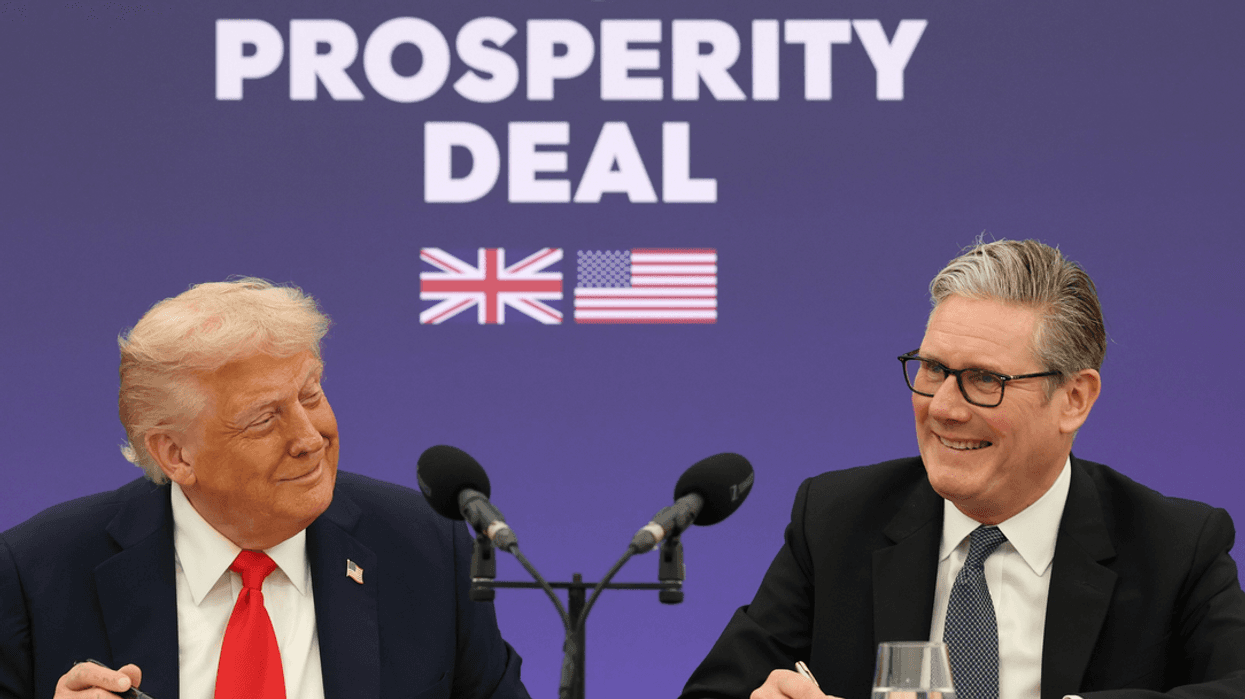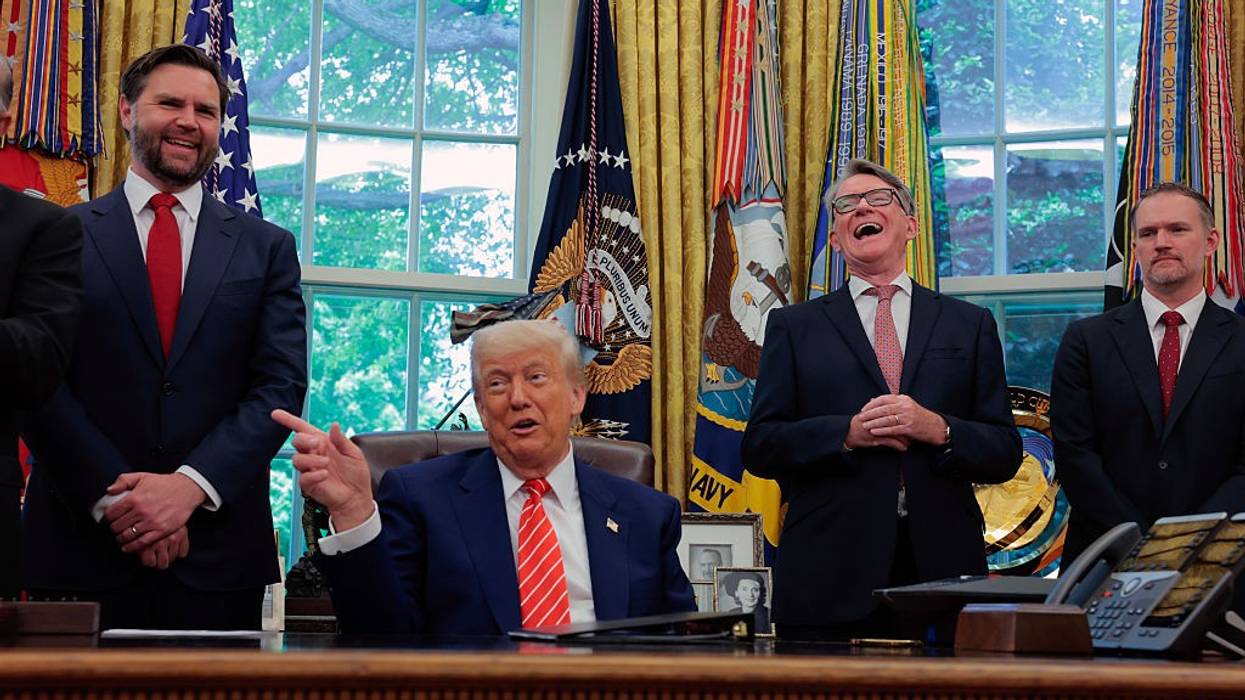As
Bloomberg detailed after the president's "Liberation Day" remarks from the White House Rose Garden:
China's cumulative tariff rate of 54% includes both the 20% duty already charged earlier this year, added to the 34% levy calculated as part of Trump's so-called reciprocal plan, according to people familiar with the matter. The European Union's rate is 20% and Vietnam's is 46%, White House documents showed. Other nations slapped with larger tariffs include Japan with 24%, South Korea with 25%, India with 26%, Cambodia with 49%, and Taiwan with 32%.
In Europe on Thursday, "the regional
Stoxx 600 index provisionally ended down around 2.7%," while "the U.K.'s FTSE 100 was down 1.6%, with France's CAC 40 and Germany's DAX posting deeper losses of 3.3% and 3.1%, respectively," according to CNBC.
In the United States,
CNBCreported, "the broad market index dropped 4%, putting it on track for its worst day since September 2022. The Dow Jones Industrial Average tumbled 1,200 points, or 3%, while the Nasdaq Composite fell 5%. The slide across equities was broad, with decliners at the New York Stock Exchange outnumbering advancers by 6-to-1."
However, as Economic Policy Institute (EPI) chief economist Josh Bivens
noted last week, "because most households depend overwhelmingly on wages from work as their primary source of income and not returns from wealth-holding, the stock market tells us nothing about these households' economic situations."
And Trump's tariffs are expected to hit U.S. households hard, as the cost of his taxes on imports are passed on to consumers.
"Tariffs can be a legitimate and useful tool in industrial policy for well-defined strategic goals, but broad-based tariffs that significantly raise the average effective tariff rate in the United States are unwise," Bivens and EPI senior economist Adam Hersh stressed in a Thursday statement—which also called out Trump for mischaracterizing one of the think tank's 2022 analyses.
"Further, the second Trump administration's rationale, parameters, and timeline for tariffs have been ever-shifting," Bivens and Hersh continued. "As the original post cited by the administration argues, tariffs should not be a goal unto themselves, but a strategic tool to pair with other efforts to restore American competitiveness in narrowly targeted industrial sectors."
Instead of strategically imposing tariffs, Trump has chosen to "give the country the most massive tax increase in its history, possibly exceeding $1 trillion on an annual basis, which comes to $7,000 per household,"
warned Center for Economic and Policy Research co-founder and senior economist Dean Baker. "And this tax hike will primarily hit moderate and middle-income families. Trump's taxes go easy on the rich, who spend a smaller share of their income on imported goods."
Baker—like various other economists and
journalists—also took aim at Trump's claims that the tariffs are reciprocal, explaining:
Trump's team
calculated our trade deficit with each country and divided it by their exports to the United States. Trump decided that this figure was equal to that country's tariff on goods imported from the U.S.
Trump's method of calculating tariffs is comparable to the doctor who assesses your proper weight by dividing your height by your birthday. Any doctor who did this is clearly batshit crazy, and unfortunately so is our president. And apparently none of his economic advisers has the courage and integrity to set him straight or to resign.
However, outside Trump's administration, the intense criticism continued to mount, including from groups focused on combating the fossil fuel-driven climate emergency, which also
endangers the global economy.
Andreas Sieber, associate director of policy and Campaigns at 350.org, said Thursday that "Trump's tariffs won't slow the global energy transition—they'll only hurt ordinary people, particularly Americans."
"Despite his claims he 'gets' economic policy, his record tells a different story: Tariffs are tanking U.S. stocks and fueling inflation," Sieber added. "The transition to renewables is unstoppable, with or without him. His latest move does little to impact the booming clean energy market but will isolate the U.S. and drive up costs for American consumers."
Allie Rosenbluth, U.S. campaign manager at Oil Change International, similarly emphasized that "Trump's tariffs will hurt working families first and foremost, raising costs for essentials we depend on and threatening to plunge the U.S. economy into a recession. Though Trump pretends to care about the cost of living for ordinary people, his real loyalties lie with his fossil fuel industry donors."
"If he actually cared about energy affordability, he would stop bullying other countries into buying more U.S. liquefied natural gas (LNG), which boosts the fossil fuel industry's profits, but results in increased prices for domestic consumers and pushes us further toward climate catastrophe," she asserted. "The one step countries can take to hit Trump where it hurts most is wean off their dependency on fossil fuels from the United States."
The impact of Trump's new levies won't be limited to working-class people in the United States. Nick Dearden, director of U.K.-based Global Justice Now, pointed out that "Trump has set light to the global economy and unleashed a world of pain, not least on a group of developing countries that will suffer tremendous impoverishment as a result of his punitive tariffs."
"All those affected must come together and stand up to this bully by building a very different international economy that promotes the interests of ordinary people rather than the oligarchs standing behind Trump," he argued. "For all its scraping and crawling, the U.K. got no special treatment here, and the government should learn this lesson fast: They need to stop giving away our rights and protections in a futile effort to appease Donald Trump."
Leaders in the United States are also encouraging resistance to Trump. U.S. Sen. Chris Murphy (D-Conn.)
said Wednesday that "this week you will read many confused economists and political pundits who won't understand how the tariffs make economic sense.
That's because they don't. They aren't designed as economic policy. The tariffs are simply a new, super dangerous political tool."
Murphy made the case that "the tariffs are DESIGNED to create economic hardship. Why? So that Trump has a straight face rationale for releasing them, business by business or industry by industry. As he adjusts or grants relief, it's a win-win: the economy improves and dissent disappears."
"But as long as we see this clearly, we can stop him. Public mobilization is working. Today, a few Republicans joined Democrats to vote against one set of tariffs," he added, referring to a
resolution that would undo levies on Canadian imports. "The people still have the power."




